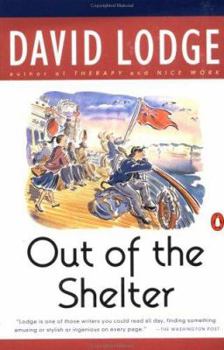Out of the Shelter
Select Format
Select Condition 
Book Overview
The restrictions of a wartime childhood in in London and subsequent post-war shortages have done little to enrich Timothy's early youth. But everything changes when his glamorous older sister, Kath,... This description may be from another edition of this product.
Format:Paperback
Language:English
ISBN:0140122796
ISBN13:9780140122794
Release Date:August 1989
Publisher:Penguin Group
Length:288 Pages
Weight:0.45 lbs.
Dimensions:0.7" x 5.2" x 7.8"
Customer Reviews
5 ratings
Brings back my memories of living in Germany in the mid-fifties
Published by Thriftbooks.com User , 19 years ago
Originally published in a slightly different form in 1970, this was one of Lodge's earliest-written books and differs considerably from his later "academic" fiction. It's also the most autobiographical of his works, featuring Timothy Young who, like Lodge, was born into a lower-middle-class family in southeast London in 1935, and who, also like Lodge, spent a month on holiday in Heidelberg in 1951 during the Allied occupation. Timothy, who is brighter than his parents really care for or understand, has a chance at university instead of apprenticeship, but he's hesitant to leave the world he's used to and in which he knows his way around so thoroughly. Going to visit his ten-years-older sister, who works for the American forces, however, is in every way the turning point of his life, his first chance to leave the "shelter" of family and habits. He discovers he can deal with foreign places and foreign people -- both Germans and Yanks -- and can get along on his own. He encounters new ideas through his sister's friends, notions that open his mind to the possibilities of the future. And he begins to figure out his own sexuality along the way. Lodge is very good with narrative. Timothy is a very sympathetic character and the writing style evolves as he does. A first-rate Bildungsroman.
Out of the Shelter
Published by Thriftbooks.com User , 19 years ago
In the summer of 1951, Timothy Young leaves London, where he had lived and suffered through the Blitz and where "austerity" keeps England on wartime rationing even worse than in Germany, to vacation with his sister Kate in Heidelberg. She has lived in Germany since early in the war, taking up with a group of men who "want to live in the present, want fun and companionship without emotional involvement." Young also befriends an intellectual conscientious objector, who points out to him just how shallow these people are. Written in 1970 and revised in 1985, this was not written as a comedy (as many of Lodge's other novels are), but it is still very funny in spots. Lodge explores some interesting ideas throughout the book, especially about loyalty and the self. Disappointing is the long epilogue that is tacked on at the end. I still thought this to be one of Lodge's better novels, though.
Funny with a twist of sadness
Published by Thriftbooks.com User , 23 years ago
As a professor, I used this book when teaching a class on British history. It's one of my favorite books and my students loved it as well. Lodge is an incredibly gifted writer and his ability to evoke the more painful aspects of adolescence (while letting you see the amusing side of it as well) is fantastic. It also provides a wonderful insight into American culture and our consumer-minded society.
The fifties seen from the sixties
Published by Thriftbooks.com User , 23 years ago
A teenager from an overly respectable family in the cramped restricted England of 1951 gets a glimpse of the good life lived by affluent Americans in Germany. Having lived in Britain and visited Germany in the fifties and come to America in the sixties I could identify with much of it. Lodge tries to use the US/UK contrast to make a point about the uses of adversity and the trauma of poverty. The problem with this is that, as a paradigm of restrictiveness and backwardness the England of 1951 wasn't that bad. I meet people now in the US from Bangladesh, Egypt, Haiti and points East and South for whom the culture shock of American wealth and freedom is infinitely greater. Fiction may not be the right vehicle for the point he wants to make. I understood more from the introduction (in which he suggests that the poverty of 1950's Britain was due to government policies)and the epilog. In the introduction he mentions an epilog by Don Kowalski that was excised from the original edition and has not been reinstated in this one. It would be interesting to read that.
Deeply felt and deftly told autobiographical novel
Published by Thriftbooks.com User , 27 years ago
British writer and critic Lodge's smart and tender novel begins in London during WW2. The narrator, Timothy, is a much-loved child in a middle class home. The voice is intimate and childishly sincere and perfectly suited to Lodge's intentions: sympathetic understanding of a very likable kid. Characters are affectionately but not cloyingly drawn, and bad things happen, too. Eventually Timothy goes to postwar US-occupied Germany to visit his much older sister (in Lodge's actual past, it was an aunt). It's a heady experience. Some of the best Lodgeisms are in this novel: the untrustworthiness of happiness, which he fears is simply "a ripening target for fate;" the meaning of travel; leavetaking and loss; loyalty to home and the known vs. the desire for adventure and newness; the powerful lure of the material world; love and eroticism and their yearned-for occasional convergence.Funny, too. This novel is a gem and a great yarn besides.






